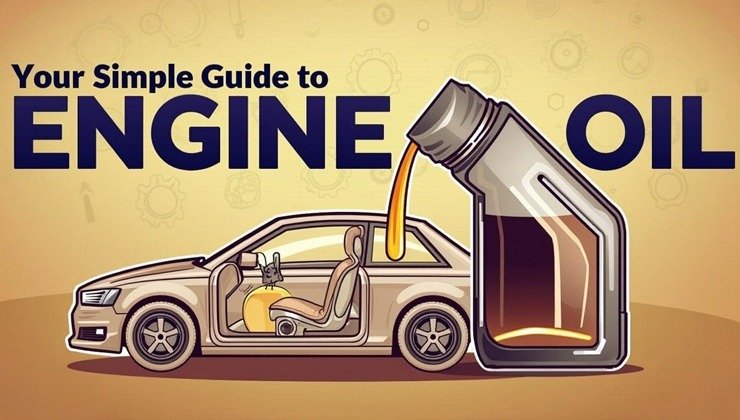Lifestyle
Your Simple Guide to Engine Oil: What You Need to Know

Engine oil is vital for keeping your car’s engine healthy and running well. Yet, the variety of oil types can make choosing the right one challenging.
In this article, we’ll explain everything you need to know about engine oil in simple terms. We’ll cover its role, functions, available types, when to change it, and how to choose the best oil for your car.
Whether you’re an expert or just starting out, this information will help you make intelligent decisions about car maintenance. The right oil ensures your engine stays strong for miles, protecting it from wear and tear. Let’s dive into the essentials of engine oil so that when you visit a nearby engine oil retailer, you’ll know exactly which type is best for your vehicle.
What Is Engine Oil?
Also known as motor oil, engine oil is a specially formulated lubricant designed for the moving parts inside an engine. It consists of base oils combined with additives that enhance performance.
The primary functions of engine oil include:
- Lubrication: Reducing friction and wear between moving parts.
- Cooling: Absorbing and dispersing heat to prevent engine overheating.
- Cleaning: Removing contaminants and preventing sludge buildup.
- Corrosion Prevention: Coating metal surfaces to protect against rust.
Modern oils are engineered to enhance efficiency and durability, especially in high-performance engines. Understanding its makeup and roles is essential for maintaining your vehicle’s health and longevity.
What Does Engine Oil Do?
Engine oil performs several critical roles to ensure proper engine operation and durability:
Lubrication: Forms a fluid barrier between moving components, minimizing friction and wear.
Cooling: Absorbs and disperses heat generated during engine operation, regulating temperature and preventing damage from overheating.
Cleaning: Suspends contaminants and particulates, keeping engine parts clean and reducing harmful sludge accumulation.
Corrosion Prevention: Creates a protective film on metal surfaces to shield against rust and corrosion.
Additive Benefits: Includes advanced additives such as:
- Detergents: Prevent deposits on engine components.
- Antioxidants: Reduce oil oxidation caused by heat and oxygen exposure.
- Viscosity Index Improvers: Maintain consistent oil thickness across temperature changes.
Such features enhance fuel economy and ensure a smoother engine experience.
Types of Engine Oil
There are four primary types of engine oil, each tailored for specific engine requirements:
1. Conventional Motor Oil:
Derived from refined crude oil, it’s cost-effective and suitable for older engines. Its performance at high temperatures is limited.
2. Synthetic Engine Oil:
Fully synthetic oils are lab-produced and offer superior stability, fuel efficiency, and performance in extreme conditions. Though pricier, their longevity and efficiency often offset the initial cost.
3. Synthetic Blend Oil:
A mix of synthetic and conventional oils, this type offers a balance of performance and cost. It provides enhanced protection over conventional oil, excelling across diverse driving conditions.
4. High-Mileage Oil:
Designed for vehicles with over 120,000 kilometers, these oils include additives that reduce oil burn-off and seal engine leaks, making them ideal for aging engines.
5 Indicators That It’s Time for an Oil Change
Routine oil changes are vital for engine health. Watch for these signs that your car may need an oil change:
- Excessive Engine Noise: Knocking or rumbling sounds can indicate low oil levels or degraded oil quality.
- Oil Smell: A strong oil smell inside the car could signal an oil leak or overheating issue, requiring immediate attention.
- Exhaust Smoke: While some vapor is normal, visible smoke may indicate internal engine issues or burning oil.
- Darker Oil Color: Fresh oil is amber or golden. Dark or murky oil often signals contamination, indicating the need for a change.
- Increased Engine Wear: Poor performance or noticeable engine wear could mean it’s time for an oil change, especially if you’ve exceeded the recommended interval.
How to Pick the Right Motor Oil for Your Car
Selecting the right motor oil is crucial for your engine’s longevity and performance. Here’s what to consider:
1. Viscosity Rating:
Check your owner’s manual for the recommended viscosity, such as 5W-30 or 10W-40. It reflects the oil’s flow characteristics across temperature ranges.
2. Oil Type:
Choose between conventional, synthetic, or synthetic blend oils based on your driving style and conditions. Synthetic options excel in harsh environments.
3. Additives:
Look for oils with advanced additives like antioxidants, detergents, and wear-reducing agents to enhance performance.
4. Driving Conditions:
Consider the climate and driving patterns. Stop-and-go traffic or adverse weather may necessitate premium-grade oil.
5. Manufacturer’s Recommendations:
Always follow your car manufacturer’s guidelines to ensure compatibility and optimal performance.
Conclusion
Engine oil plays a critical role in maintaining your vehicle’s performance and extending its lifespan. Understanding oil types, their benefits, and replacement schedules ensures your car operates efficiently for years.
Choosing the right oil and adhering to recommended change intervals can maximize engine health and efficiency. Regular maintenance ensures your car delivers consistent, reliable performance.
Engine oil dealers near me can help you find the right products for your vehicle.
-

 Quotes3 years ago
Quotes3 years ago53 Motivational Gym Quotes to Fuel Your Workout
-

 Motivation5 years ago
Motivation5 years ago4 Fun New Hobbies To Try This Year
-

 Quotes10 years ago
Quotes10 years ago50 Most Powerful Quotes Ever Spoken
-

 Quotes2 months ago
Quotes2 months ago100 Motivational Quotes to Inspire You in 2026
-

 Quotes2 years ago
Quotes2 years ago43 Inspirational Quotes About Thoughts
-

 Quotes3 years ago
Quotes3 years ago105 Motivational Quotes by Famous People
-

 Quotes7 months ago
Quotes7 months ago100 Motivational Quotes to Start Your Day with Positivity
-

 Education1 year ago
Education1 year agoHow to Motivate Yourself to Study: 6 Proven Techniques































